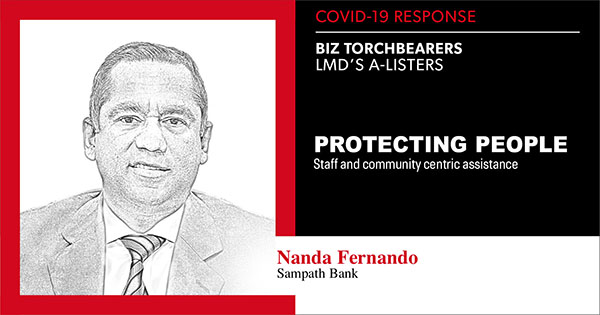Q: In summary, how has the bank played a part in mitigating the impact of the crisis arising from the COVID-19 pandemic?
On the 27 January, we appointed a cross-functional team to monitor and take remedial action.
We had direct contact with the epidemiology unit centrally and sought advice through them; and we made it a point to communicate everything to our staff.
I can say confidently that our staff members were aware of how to reduce the risk of infection from January. We had imposed a limitation to travel abroad on 5 March, well before the pandemic affected Sri Lanka.
We then made it a point to impose conditions on compulsory quarantine and self-quarantine requirements such as for staff who had been overseas before this time. Further, we released pregnant employees from work by granting them paid leave to ensure their safety.
Additionally, we advised staff to minimise their use of public transport and granted a special travel allowance.
Masks and sanitizers were distributed to all staff and we even changed our office attire to avoid unnecessary contamination. Training, both foreign and in-classroom, was curtailed and moved online. An interim guide was published with continuous communications and poster campaigns.
Visits were made by several corporate members to various branches in order to assess the ground situation and respond to any fears of working among the staff. For staff safety, 24-hour hotlines were introduced and a counselling cell was opened.
Q: And in what spheres has this assistance made a mark, in your view?
Customers enjoyed revitalised online banking efforts and were the first islandwide to receive doorstep cash deliveries. Employees on the other hand, enjoyed job security and stability with travel allowances, differed loan recovery periods and counselling.
We strengthened our digital platforms and released staff from mundane work, and minimised their need to work in office. As more than 70 percent of our staff travel from home, we assigned them to the nearest workstations where necessary.
Meanwhile, a special business continuity plan is already in place to manage any protracted lockdowns that may arise.
As a bank that strives to be community centric, we also made it a point to donate a PCR laboratory and personal protective equipment (PPE) kits while also conducting regular webinars on business resilience for SMEs by a panel of experts. And we offered loans for community development including a low interest loan scheme called ‘Revive Sri Lanka.’
The bank also engaged in nation building endeavours by supporting various initiatives such as green inventions, restoration of tanks for agriculture, entrepreneurial development (through ‘Sampath Saviya’) and encouraging saving for the future.
Furthermore, junior staff members with comparatively lower incomes were offered salary advances to meet urgent expenses during curfew. A travel allowance was paid to all staff on request to avoid commuting difficulties, mainly for those who use public transportation. We also refrained from deducting staff loan instalments to help them financially.
In addition, alternative resource personnel such as interns, industrial placements and outsourced personnel were paid irrespective of their attendance. Bonuses and all other allowances were also paid as usual despite the curfew in order to support our staff’s other financial commitments.




